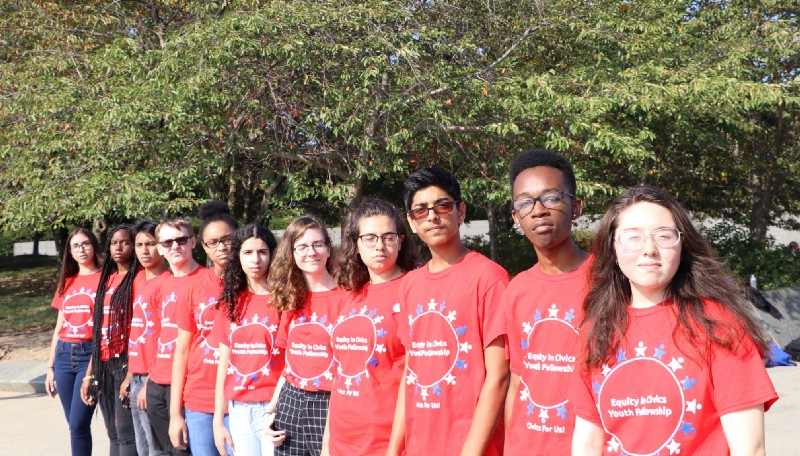
Each month, students from the Equity in Civics Youth Fellowship and the Youth As Civic Experts network meet virtually to discuss topics on equity in civic education. During this month’s discussion, students grappled with issues of equity in civics in their respective schools and communities. For many students, they equated equity in civic education with student access to high-quality civic learning experiences. Students shared the variety of civic experiences missing from their curriculum and discussed some ways in which students were able to solve civic problems in their own communities.
The Fellows and Youth Experts viewed the combination of teacher-led, in-class learning with student-led organizations as integral to the civic learning experience. On the topic of student engagement and making civics relevant for students, Caleb Dunson, a senior from Chicago said, “Students should have the opportunity to take something that they’re passionate about, find out how it relates to civics, and try to influence legislation or create change centered around that topic”. Civic learning platforms like iCivics, Mikva Challenge, and Generation Citizen were named by students as instrumental in their receiving what they deemed as high-quality civic learning experiences. The benefits of these programs were anything from solidly understanding civic concepts to elevating student voice within the framework of school policies and community politics.
Many of the meeting participants supported student voice as a critical component to engaging students in civic education. “Students shouldn’t be afraid of voicing their opinions and beliefs, which can be intimidating when you’re alone,” said A’Niya Bankston, a junior from California. She went on to express why she believed in a “strength in numbers” approach, where students are encouraged to unite to create the changes they wish to see in their schools and communities.
When asked: Do you think civics is equitable at your school? How do you know? During the meeting, many participants agreed that school policies that use GPAs to restrict students from participating in civic programs or prevent students from taking AP classes are inequitable. Reserving the best civic experiences for “high-achieving” students, leaves a large portion of the student population at a disadvantage when they graduate. When asked what the lack of a solid civics foundation leads to, Ourania Parastatidis of Boston expressed that “it leads to extremes. And though they [students] may be active, it [the lack of a solid civic foundation] leads to extreme opinions and a lack of inclusiveness”.
In an offline assignment on equitable civics in their school, one student expert commented on civics at their school saying: “we do not participate in common practices such as having classroom discussions on current community events or the democratic process. Most of our curriculum is based on historical events, our government, and historical, political leaders which doesn’t accommodate students of color…“
According to best practices laid out in The Civic Mission of Schools report, schools can help develop competent and responsible citizens when students can participate in intensive classroom instruction; engage with simulations and experiential learning; discuss controversial issues; participate in service-learning; gain media literacy skills, or produce a student-led policy project. You can read more about these types of recommendations in the CivxNow Policy Menu.
Meeting participants were very pragmatic about the realities that students face when pursuing civic interests. So what did these students have to say about facing setbacks or engaging with adults that are not moved to make the changes that students are suggesting? Matthew Green, a junior from Pennsylvania offered a bit of advice: “It helps if you try again; if you don’t just give up the first time. It shows the lawmakers and those in charge that this is something you’re serious about”.
What about this discussion resonates with you? Add your voice! Join the discussion on social media using #CivicsForUS.
The Youth As Civic Experts network will lead a social media discussion on equity in civic education starting March 2nd. Watch the promotional video below to learn more!
Staff write-up by Amber Coleman-Mortley, Director of Social Engagement, iCivics.


 See All
See All